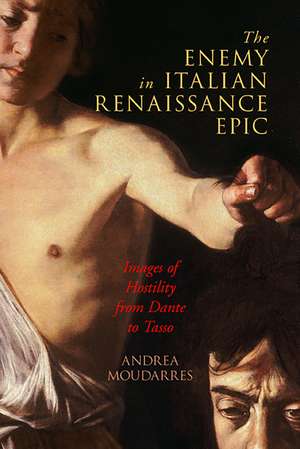The Enemy in Italian Renaissance Epic: Images of Hostility from Dante to Tasso: The Early Modern Exchange
Autor Andrea Moudarresen Limba Engleză Paperback – mai 2019 – vârsta ani
In The Enemy in Italian Renaissance Epic, Andrea Moudarres examines influential works from the literary canon of the Italian Renaissance, arguing that hostility consistently arises from within political or religious entities. In Dante’s Divina Commedia, Luigi Pulci’s Morgante, Ludovico Ariosto’s Orlando Furioso, and Torquato Tasso’s Gerusalemme Liberata, enmity is portrayed as internal, taking the form of tyranny, betrayal, and civil discord. Moudarres reads these works in the context of historical and political patterns, demonstrating that there was little distinction between public and private spheres in Renaissance Italy and, thus, little differentiation between personal and political enemies.
Published by University of Delaware Press. Distributed worldwide by Rutgers University Press.
Published by University of Delaware Press. Distributed worldwide by Rutgers University Press.
| Toate formatele și edițiile | Preț | Express |
|---|---|---|
| Paperback (1) | 312.59 lei 6-8 săpt. | |
| University of Delaware Press – mai 2019 | 312.59 lei 6-8 săpt. | |
| Hardback (1) | 601.28 lei 6-8 săpt. | |
| University of Delaware Press – mai 2019 | 601.28 lei 6-8 săpt. |
Preț: 312.59 lei
Nou
Puncte Express: 469
Preț estimativ în valută:
59.85€ • 61.39$ • 50.39£
59.85€ • 61.39$ • 50.39£
Carte tipărită la comandă
Livrare economică 27 februarie-13 martie
Preluare comenzi: 021 569.72.76
Specificații
ISBN-13: 9781644530016
ISBN-10: 1644530015
Pagini: 262
Dimensiuni: 152 x 229 x 18 mm
Greutate: 0.37 kg
Editura: University of Delaware Press
Colecția University of Delaware Press
Seria The Early Modern Exchange
ISBN-10: 1644530015
Pagini: 262
Dimensiuni: 152 x 229 x 18 mm
Greutate: 0.37 kg
Editura: University of Delaware Press
Colecția University of Delaware Press
Seria The Early Modern Exchange
Notă biografică
Andrea Moudarres is Assistant Professor of Italian at UCLA and coeditor, with Christiana Purdy Moudarres, of New Worlds and the Italian Renaissance: Contributions to the History of European Intellectual Culture.
Descriere
In The Enemy in Italian Renaissance Epic, Andrea Moudarres examines influential works from the literary canon of the Italian Renaissance, arguing that hostility consistently arises from within political or religious entities. In Dante’s Divina Commedia, Luigi Pulci’s Morgante, Ludovico Ariosto’s Orlando Furioso, and Torquato Tasso’s Gerusalemme Liberata, enmity is portrayed as internal, taking the form of tyranny, betrayal, and civil discord.
















